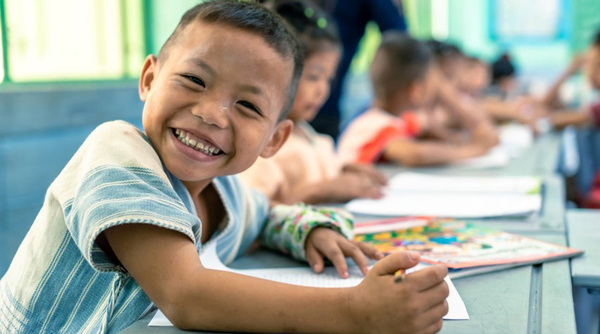In low- and middle-income countries, over half of children cannot read and understand a simple story by age 10. This learning crisis threatens countries’ efforts to build human capital and achieve Sustainable Development Goals, undermining poverty reduction.
SHARE's (Supporting Holistic and Actionable Research in Education) research study in the Philippines — LITES (Language of Instruction Transition in Education Systems) — seeks to understand key elements needed to affect progress in the country’s language of instruction policy, a critical area to strengthening the Philippine education system by building on and sustaining gains in literacy.
 The Philippines is an ethnically diverse country, and there are over 120 individual languages spoken.
The Philippines is an ethnically diverse country, and there are over 120 individual languages spoken. A country’s language of instruction policy refers to the official language or languages used in educational institutions. This policy outlines the language in which subjects are taught, textbooks are written, and examinations are conducted.
In multilingual countries, the choice of the language of instruction is often a complex and sensitive issue, reflecting efforts to balance linguistic diversity with the need for effective communication and education. In addition to impacting access to education, academic success, and social inclusion, language of instruction policies play a significant role in shaping national identity and fostering a sense of cultural unity.
“Implementing multilingual education policies is a major challenge,” the study’s Primary Investigator, TJ D'Agostino, says, “especially in a context as linguistically diverse as the Philippines.”
Through research on policy design and implementation, the LITES study supports literacy acquisition in bilingual environments in upper primary schools. D'Agostino says first language (L1) instruction has yet to be prioritized in the Philippines, where over 120 languages are spoken. While native languages are sometimes used for instruction until Grade 3, English is the Philippines' primary language of instruction.
The LITES project team is working with Philippine partners to conduct a root cause analysis to determine if being taught in the mother tongue when starting school improves or impairs learning outcomes. Initial data suggests that students learn best when starting in a language they can speak and understand, and schooling in a native language leads to more positive attitudes in the classroom.
Philippines Vice President and Secretary of Education Sara Zimmerman Duterte expressed her appreciation to the Pulte Institute, thanking SHARE and the LITES project team for their rigorous collection methods and supplying government officials with data. SHARE's research questions are built around the central issue of whether mother tongue is a necessary factor for inclusion and quality learning.
“I am grateful that we have partners and critical stakeholders committed to generating empirical evidence on how to effectively transition instruction from a first to a second language and other additional languages. The Department of Education looks forward to receiving a copy of your research findings,” Duterte says. “Together, let us work towards the goal of English language proficiency within the context of a multilingual nation.”